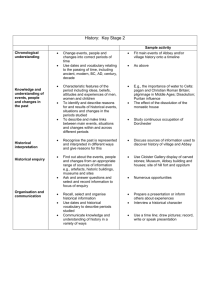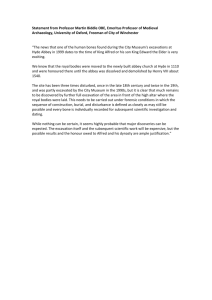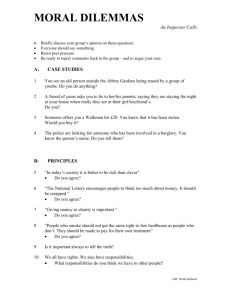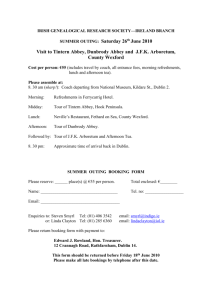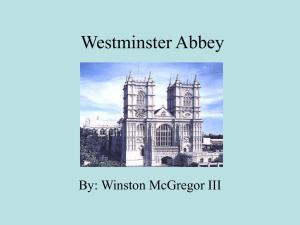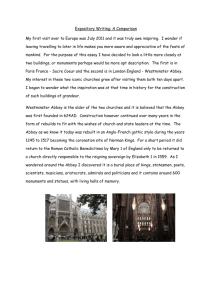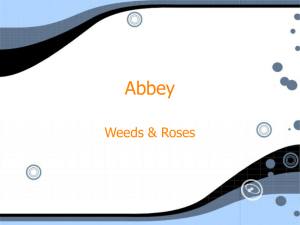Edward Abbey/ Mountain Lion
advertisement
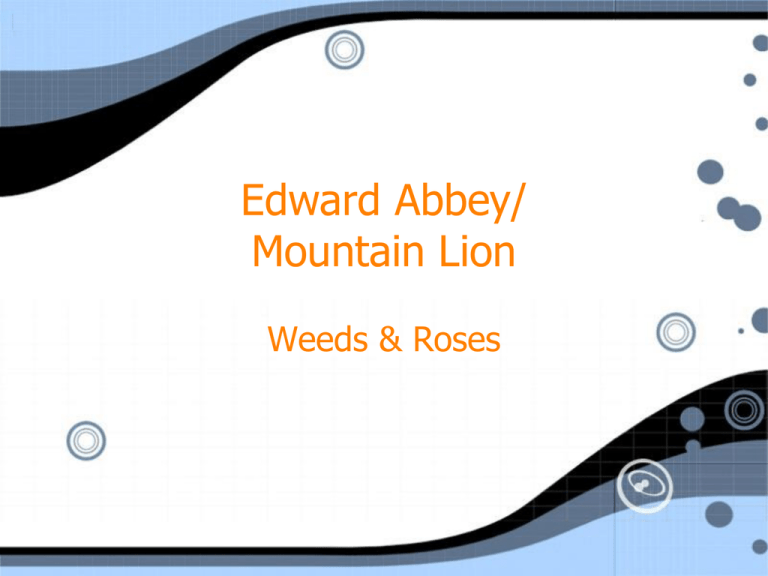
Edward Abbey/ Mountain Lion Weeds & Roses Roses! • Hooray! We’re analyzing & analyzing accurately! • Great use of noticing shifts as a way to organize your essay • Mention of transcendentalism-- perfect allusion for this piece! • Conclusions were so much better! Weeds– things to work on; focal points for next week’s AP Write! • • • • Making solid transitions Enhancing Intros (Possibly) Adding some Voice Improving thoroughness Transitions (around shifts) ** Use a time transition ** Form a new paragraph at each shift (I had a lot of people not do this, so I must not have made this clear!) ** Topic sentence should give an overview of the entire section. Which one? Abbey starts with saying he feels “more wonder than fear” when he encounters a mountain lion. or Abbey starts with an anecdote of an enounter he had years ago with a mountain lion. ** Use commas with transitions First, Abbey… Then, he… Finally, he Decent use of shiftsAbbey begins with a flashback… Abbey then shifts to a present-day anecdote… Abbey ends his piece with a philosophical reflection… **Shifts, transitions, moves to, changes to, starts, ends, in the ___ paragraph, on line ___ Rosy Transitions Even better-• Although most of the piece is written in the present tense, Abbey first uses a flashback to show the lasting impression that the A Canyon has made on him. • After using the flashback of the mountain lion, Abbey returns to his current visit to the Canyon. What he experiences may be different than his encounter with the mountain lion, but nonetheless, it is again special to him. • At the end of his essay, Abbey leaves the descriptions of his physical explorations behind and instead chooses to explore a broader realm-- the philosophical meaning of nature. • Abbey continues his essay by personally escorting the reader through the canyon with his vivid details and outdoor knowledge. Transitions Next week’s goal-1) Organize by breaks 2) Try to use a more sophisticated transition by mentioning the last section and entering into the new one. Work on intros: • Most people are starting with a bullet thesis. This is fine. • Beware of the “hook,” which can sound rather cliche. • There are so many places in the world to explore. • Everything is from nature. • The natural world is in many ways unknown. Intro Idea #1: ** Only use a hook if you directly connect it to the passage and to the thesis. Example: In our society today, it seems as if nature often eludes us among our concrete skyscrapers and modern technology. Although humanity has distanced themselves from it, nature can always be discovered and acknowledged. ** In this passage, Edward Abbey conveys his experiences and enthusiasm for the Aravaipa Canyon to expose the mystery and beauty of the natural world using imagery. • Example: In our society today, it seems as if nature often eludes us among our concrete skyscrapers and modern technology. Although humanity has distanced themselves from it, nature can always be discovered and acknowledged. Edward Abbey describes his day in Aravaipa Canyon as just that– a pilgrimage to “enrich the urban days to come.” In this passage, Edward Abbey conveys his experiences and enthusiasm for the Aravaipa Canyon to expose the mystery and beauty of the natural world. Intro Idea #2 Better yet, change the order & intro using an example or powerful word choice from the passage. •Edward Abbey describes his day in Aravaipa Canyon as a spiritual pilgrimage to “enrich the urban days to come.” Our world may be focused around concrete skyscrapers and technology which distances ourselves from nature, but Abbey conveys his experiences and enthusiasm for the Aravaipa Canyon to argue that the mystery and beauty of the natural world is redemptive and powerful. Just as Thoreau had Walden Pond, Edward Abbey has the Aravaipa Canyon. Edward Abbey writes this passage from Down the River to show his love and respect for the Aravaipa Canyon. Intro idea #3– Go full circle • Leave space before your thesis. • Finish essay. • Take your last idea in your conclusion and insert it creatively into your intro. Example: For a city slicker like Edward Abbey, he needed a place of sanctuary, of refuge, and of “redemption.” To him, Av Canyon was his saving grace in a concrete world. It is for this reason that he fashioned his essay “Down the River” about the A canyon with such love, respect, and admiration, thereby encouraging and inspiring his readers to experience the transcendence and mystery that nature has to offer. To work on: VOICE! • Now that you are finding the cow and feeling a little more comfortable with analysis, find your voice! • Find--and use--your voice! Relax your voice. • When AP Graders are reading, they’ve heard 1,000 sentences just like this: • Abbey’s anecdote about his encounter with the mountain lion shows his awe and respect for nature. • Imagine how you would tell you mom about this incident--excited, engaged, etc. Roses-- Examples of Voice Although this cat could run at him with lightning speed and ferocious fury, Abbey still felt as if it was worth risking his life to be able to experience the feeling of looking straight into the large eyes of nature, to experience and connect with this overwhelmingly dominating environment. I often hike, and I hike in mountain lion territory. This scares me to the point where I will carry rocks in my pockets. But Abbey experiences the sheer opposite. His encounter is one of tranquility and respect. While my attitude is man versus nature-- survival, his is man with nature-- communion. Examples of Voice/ imitate the writer’s voice When Abbey is in touch with nature, he is in his own mystery world, his own personal Walden Pond. Abbey views nature as a haven from the urbanized, concrete life of humanity. Nature is humanity’s get-away-- a place in one is able to transcend. Examples of Voice • Imagine how you would tell your mom about this incident--excited, engaged, etc. • Imitate the tone/attitude of the piece– if it is humorous, add humor; cynical– add cynicism; poetic– add poetic devices. How would you imitate Abbey’s passage? • Be “a mind at work,” be into the passage, react to it Using I occasionally (an if appropriate) can add a nice touch to your analysis. Use stylistic touches • This is NOT creative writing, so do NOT get carried away. Do not be cheesy • Touches include: • • • • • Analogies Personification Allusions Strong word choice Varied sentence structure ** A 7 is a 6 with a magical moment or a 6 that is really thorough. Time to pass back essays & read a few more roses. Check your thoroughness • First, let’s create common breaks so that we can better discuss the passage. • You had good thesis statements and did a nice job having your analysis return to your thesis. • If and when you start to feel repetitive, think about SYNONYMS!! • Next slide= thoroughness & synonyms! Check your thoroughness • Abbey begins the passage using an anecdote of an encounter with a mountain lion. • “years before”- he still remembers (lasting memory) • WC-- “mutual curiosity,” “more wonder than fear,” “big cat,” curiousity, wonder, awe, respect) • Magical WC-- “gloom,” “twilight,” “melted,” “peered” (mysterious, mystical, awesome, surreal) • Loss of time-- “a minute or perhaps five” (enveloping, appreciation, wonder, awe) Re-write the mountain lion section using these sentence starters While... It is interesting to note... Even… Just like… The reader can… Abbey seems... I… Instead of... Abbey begins the passage using an anecdote of an encounter with a mountain lion. While most people would be scared out of their wits ( I know I would be!), Abbey seems calm and collected as he and the “big cat” “peer” at one another. His word choice sets up feelings of respect and “mutual curiosity” rather than fear, dominance, and survival. Even the way he describes the encounter at “twilight” and “through the gloom” adds to the magical--even mystical-- aura. Instead of the mountain lion or him running away, there is a relaxed exchange of “a minute or five” before the cat “melt[s] away. It was clearly an amazing experience for Abbey to experience this connection with nature at its finest and to re-tell his story in this essay! Present day anecdote • Return to the canyon • Jargon-- wildlife, tracks (Knowledge, appreciation) • Comparison of the pigs to us (connection with nature); comment on humanity compared to nature-”if not so dangerous” • “Full of life as it is beautiful” • Imagery- water, stars, nightfall, arid climate, cold air (observant, appreciative, fully present) • Time reference “seems alarmingly short” & short sentence “it is” (time flies when you’re having fun) Philosophical reflection • Allusion to Thoreau (philosophical, reflective, transcendent, appreciative) • Refutes Fuller quotation (philosophical, reflective) • Paradox-- “comprehensible” in part but worth the effort; “not a problem but a mystery” (reflective) • Repetition of never (passionate, emphatic, appreciative) • Juxtaposition-- small, trivial, useless, precious (insightful, appreciative) • “redemption”-- spiritual, meaning of life (spiritual, holy) Focal points for next week’s AP Write 1) 2) 3) 4) Analyze accurately & thoroughly (90/90’s, SOAPST, shifts) Constantly be asking yourself-- Why? Why does the author use ______? Why does he appeal in that way? What impact was he going for? How would the recipient audience react? Why does he put this first, and second, …last? And be INTERESTING/ insightful as you do this! When organizing by breaks, make your transitions smoother by adding analysis. Try to tie the paragraphs/ order together. Relax your voice/ find your voice! Be engaged with the passage. Take a risk and be stylistic. (Especially in conclusion and possibly in the intro).

